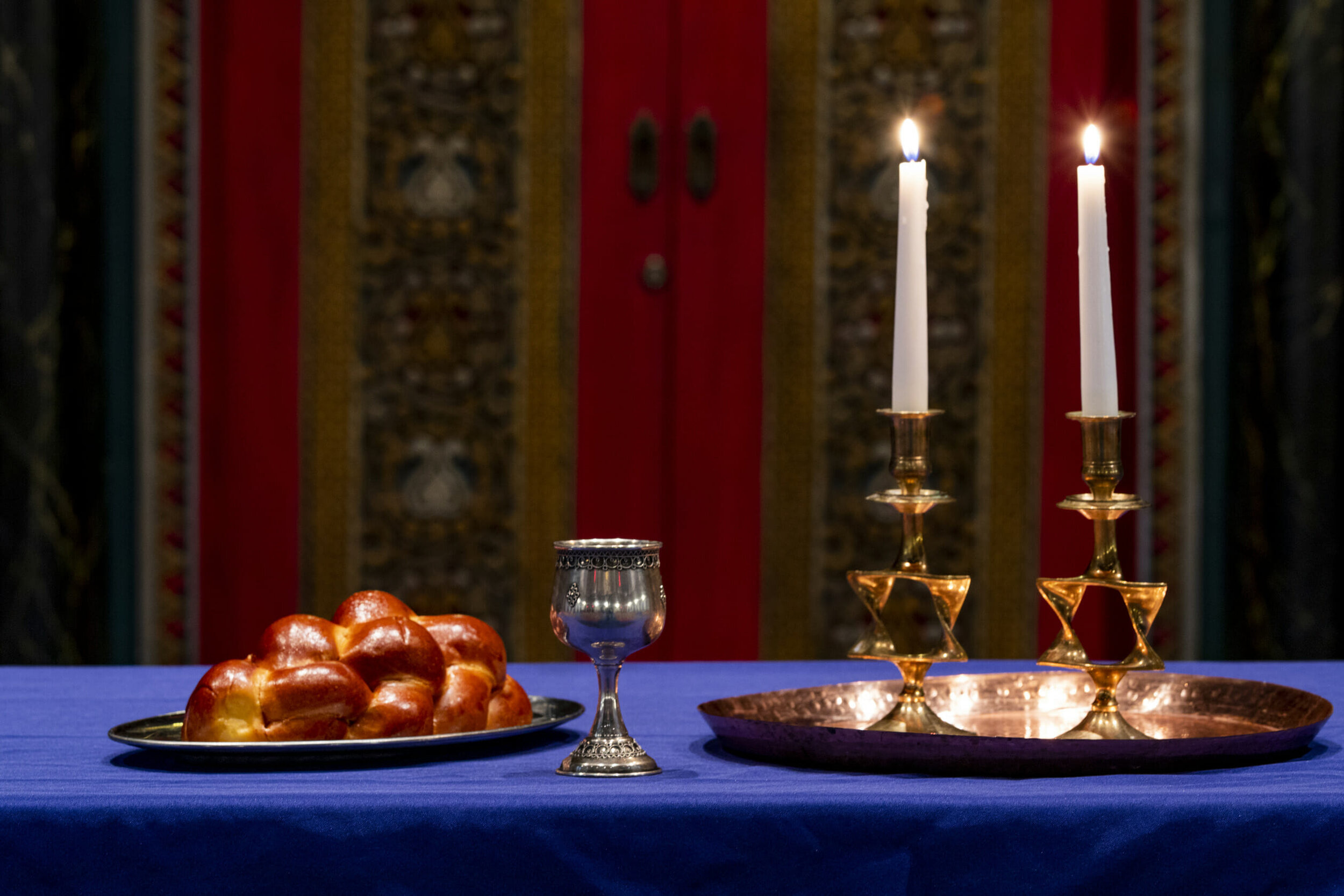About Friday Evening Services
‘There was evening and there was morning.’
First, here's what to expect when coming to a Reform synagogue for Shabbat services.
In Genesis, on each day God completed, it concludes by saying, 'there was evening, and there was morning.’ Following this, Jewish culture and calendar see each day starting and ending at sunset. The seventh day, Shabbat, a day of rest and refraining from work concerns, is no exception. Shabbat is the most important of all Jewish holidays, even though it comes each week as soon as three stars can be seen in the sky. Traditionally, the food for the day would be made, and the house cleaned and ready for Shabbat by sunset. A unique braided sweet bread loaf called Challah became a tradition to honor Shabbat.

In terms of prayer, Friday evening services are composed of two main parts:
Kabbalat Shabbat (greeting the Sabbath), and
Maariv (bringing on the Evening).
KABBALAT SHABBAT
First created by Jewish mystics fleeing the Inquisition, this joyful service originated in northern Israel in the 1500s. In the town of Tsfat (Safed) in the mountains north of the Kinneret (Sea of Galilee), scholars and mystics including Joseph Karo, Shlomo Alkabetz, and Moses Cordovero would greet the Sabbath with song, either in the synagogue or in the fields. They conceived of Shabbat as a bride who comes each week to be with her beloved, God. As a result, there was a double portion of peace and love on this holy day.
Kabbalat Shabbat typically consists of:
Shabbat songs, particularly Yedid Nefesh, Dodi Li, or other wordless melodies known as nigguns
The lighting of Shabbat Candles
Songs or readings from Psalms 95-99, and 29
The hymn, Lecha Dodi , written by Shlomo Alkabetz which calls on us to greet the Sabbath bride. It is customary to stand and open the door for the final verse.
Psalm 92, the song sung on Shabbat since the Biblical period.
Psalm 93 is sometimes read, or the song Shalom Aleichem sang.
Hatzi Kaddish, the short kaddish marks the transition from the Kabbalat Shabbat Service to the Maariv Service, chanted while standing.
MAARIV
(also known as Arvit)
The Shabbat evening service follows the same order as the weekday evening service. Many of the prayers in these services were likely recited in synagogues during the Hellenistic period around 330 BCE. Some of these prayers were recorded in the Mishnah (c. 250 CE) and the order was further refined in the period of the Talmud (350-750 CE). Since then, additional prayers and hymns have been incorporated into the service. The Reform liturgy removes or changes those traditional prayers focused on the priesthood, temple sacrifices, messianic hope or resurrection of the dead at the end of time.
The MAARIV services follow the following basic order:
THE SHEMA AND HER BLESSINGS
Bar’chu (call to worship, chanted while standing)
Ma’ariv Aravim (thanking God for creating evening, light, and dark)
Ahavat Olam (thanking God for showing love through giving of Torah)
SHEMA (the central affirmation in a belief in one God)
V’AHAVTA (part of the Shema, the paragraph immediately following in Deuteronomy 6. It reminds us to love God evening and morning, at work and at home, to place these words on our arms and heads (tefillin) and to write these words on our doors (mezuzah)
MI CHAMOCHA (Who is like You?, the opening of the Song of the Sea, the oldest Hebrew poem sung after the Israelites crossed the sea escaping from slavery in Egypt.)
HASHKIVENU (asking that we might sleep in peace and awake to life, a prayer for safety).
V’SHAMRU (a sung version of the Biblical command to observe Sabbath found in Exodus 31) We stand for this and the following prayers.
THE AMIDAH (This series of prayers is said standing, usually silently on Friday evening, and is the central prayer of the service. It gives thanks for ancestors, life, holiness, Shabbat, God’s goodness, and peace. It is often ended with a song, such as Shalom Rav or Oseh Shalom.
The Mi Shebeirach (prayer for healing) is usually said after the Amidah.
ALEINU (It is our duty). The “Adoration” and first of a series of concluding prayers. This prayer was originally said only by the Cohen Gadol (High Priest) in the Jerusalem Temple, but is now said after the Amidah as a concluding moment of adoration. It is traditional to bow low during the line “Va’anachnu korim” (and we bow…).
MOURNERS’ KADDISH . A Kaddish prayer said in memory of those who have died by people in mourning for a loved one who has died recently, or observing a yahrzeit, or yearly anniversary of death.
CLOSING SONG. To end the service with joy and song, these songs usually praise God for the miracle of life and creation, or give thanks for Shabbat. Some popular songs include Adon Olam, Yigdal, Oseh Shalom, Ein Keloheinu, or Ein Adir.
KIDDUSH. On Friday nights, an extended blessing over wine in thanks for the creation of the world and for liberation from slavery. This is immediately following by the Motzi, or blessing over the challah. This prayer is said either in the sanctuary, or at the Oneg, or reception after the service.


